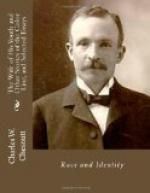After five years of unrequited toil, and unspeakable hardship in convict camps,—five years of slaving by the side of human brutes, and of nightly herding with them in vermin-haunted huts,—Ben Davis had become like them. For a while he had received occasional letters from home, but in the shifting life of the convict camp they had long since ceased to reach him, if indeed they had been written. For a year or two, the consciousness of his innocence had helped to make him resist the debasing influences that surrounded him. The hope of shortening his sentence by good behavior, too, had worked a similar end. But the transfer from one contractor to another, each interested in keeping as long as possible a good worker, had speedily dissipated any such hope. When hope took flight, its place was not long vacant. Despair followed, and black hatred of all mankind, hatred especially of the man to whom he attributed all his misfortunes. One who is suffering unjustly is not apt to indulge in fine abstractions, nor to balance probabilities. By long brooding over his wrongs, his mind became, if not unsettled, at least warped, and he imagined that Colonel Thornton had deliberately set a trap into which he had fallen. The Colonel, he convinced himself, had disapproved of his prosperity, and had schemed to destroy it. He reasoned himself into the belief that he represented in his person the accumulated wrongs of a whole race, and Colonel Thornton the race who had oppressed them. A burning desire for revenge sprang up in him, and he nursed it until his sentence expired and he was set at liberty. What he had learned since reaching home had changed his desire into a deadly purpose.
When he had again bandaged his feet and slipped them into his shoes, he looked around him, and selected a stout sapling from among the undergrowth that covered the bank of the stream. Taking from his pocket a huge clasp-knife, he cut off the length of an ordinary walking stick and trimmed it. The result was an ugly-looking bludgeon, a dangerous weapon when in the grasp of a strong man.
With the stick in his hand, he went on down the road until he approached a large white house standing some distance back from the street. The grounds were filled with a profusion of shrubbery. The negro entered the gate and secreted himself in the bushes, at a point where he could hear any one that might approach.
It was near midday, and he had not eaten. He had walked all night, and had not slept. The hope of meeting his loved ones had been meat and drink and rest for him. But as he sat waiting, outraged nature asserted itself, and he fell asleep, with his head on the rising root of a tree, and his face upturned.
And as he slept, he dreamed of his childhood; of an old black mammy taking care of him in the daytime, and of a younger face, with soft eyes, which bent over him sometimes at night, and a pair of arms which clasped him closely. He dreamed of his past,—of his young wife, of his bright children. Somehow his dreams all ran to pleasant themes for a while.




